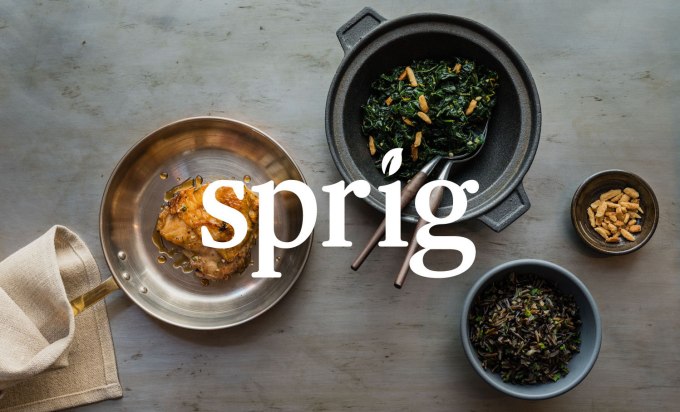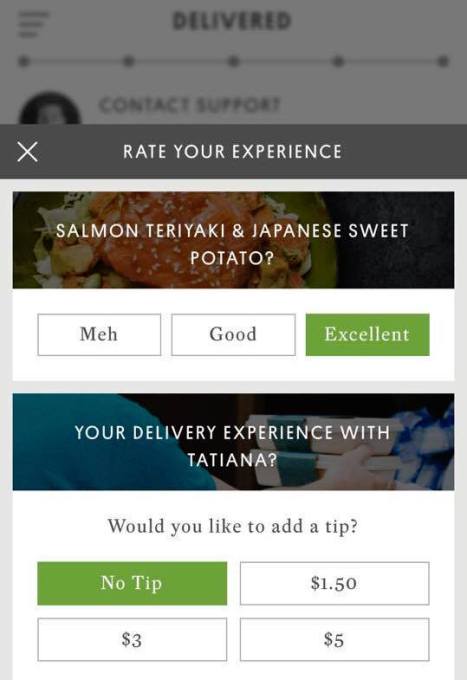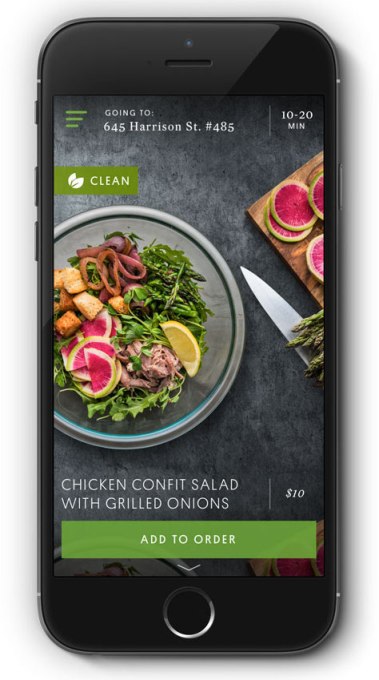Some Sprig customers might be bitter about getting guilt-tripped into tipping, but at least the startup is being sweet to its on-demand food servers. TechCrunch spotted that Sprig added a tipping feature to its freshly made meal-delivery app this week.
Now Sprig has confirmed this is part of a wide-range of not-yet-announced perks for its servers, including a $1/hour wage increase, to $14.50, and the ability for those who work more than 35 hours a week to receive full-time employee status with health benefits and equity grants.
Sprig tells me its goal is to make 40-50 percent of its servers full-time. That might sound like a death sentence for the notoriously slim margins of the on-demand space, but Sprig’s CEO Gagan Biyani tells me “We think we’ll make it back in retention.” If Sprig can keep servers loyal, it could recoup the costs of these bonuses by reducing employee churn, thereby lowering its recruiting and training costs.

Since launching in 2013, Sprig has raised $56.7 million to cook and deliver its own line of health-conscious lunches and dinners. Meals like salmon teriyaki with Japanese sweet potato and chicken confit salad (plus juices and desserts) are delivered in San Francisco in 15-45 minutes for about $13 plus a $1-$4 delivery fee.
Sprig is already one of the most progressive employers in the on-demand world. Last January it made all servers into actual employees, instead of independent contractors like Uber; 10 percent of its workforce is full-time. It also pays servers a $0.535/mile gas reimbursement plus $1 per shift for using data on their phone.
Paying enough to live in SF?
 Now Biyani says Sprig “wants to help our servers make enough money to afford what’s an expensive cost of living out here [in SF].”
Now Biyani says Sprig “wants to help our servers make enough money to afford what’s an expensive cost of living out here [in SF].”
The new tipping feature appears on the screen when you rate the food you just received, showing up after customers rate their deliverers. Users can stick with the default “no tip” or add a $1.50, $3 or $5; 100 percent of the tips go to the deliverers.
You won’t be penalized with longer delivery times or anything like that if you don’t tip, Biyani confirms. “There are no repercussions for customers that do or do not tip and we have no intention to add that.”
The biggest question, though, is whether the tipping feature degrades Sprig customer delight by making them feel guilty if they don’t throw their server a few extra bucks. It adds a little moment of “do I burn my wallet or my karma?”
“Because we offer competitive compensation, we believe customers should tip at their discretion and need not feel guilty if they don’t,” Biyani explains. “I think people are used to, in the delivery space and restaurant space, having some tip option and we’re just providing that.” Still, it could push some customer to competitor UberEats that purposefully lacks a tipping feature.
On-demand, full-time
Sprig is also opening a new program where part-time servers can qualify to become full-time employees if they work more than 35 hours per week. This status comes with medical, dental and vision benefits that don’t require an employee contribution. Though the details aren’t hammered out yet, Sprig also plans to offer equity to these employees to align incentives so they’ll benefit if the startup succeeds.
 “Our goal is to be the employer of choice for delivery drivers in SF…I think that pays for itself pretty quickly if we’re right,” Biyani states. Additionally, Sprig is opening more senior full-time Server Captain and supervisory roles, and it will give existing part-time servers first-crack at applying for them.
“Our goal is to be the employer of choice for delivery drivers in SF…I think that pays for itself pretty quickly if we’re right,” Biyani states. Additionally, Sprig is opening more senior full-time Server Captain and supervisory roles, and it will give existing part-time servers first-crack at applying for them.
“We don’t expect the cost of Sprig to change,” Biyani notes, ” despite all the added benefits for workers.” That means it was already making healthy enough margins to support the changes, it was spending a fortune on recruiting and training to fight employee churn that it will now save, it’s comfortable losing money as it strives for scale thanks to its venture capital support or some combination of these.
Another on-demand food startup, grocery deliverer Instacart, tried to eliminate its tipping feature earlier this year and replace it with a service fee, but ended up bringing it back in different form following backlash. Yet a small study by BuzzFeed’s Caroline O’Donovan found servers were making 30 percent less after the changes, which Instacart’s CEO said was necessary to maintain the company’s growth.
Sprig is in a different position because it cooks the food in bulk itself, rather than having to pay retail prices to buy it off the grocery store shelves like Instacart. But Sprig still refuses to discuss any of its financials. It’s unclear if the company already makes a profit per delivery, or if it’s hoping to accomplish that with greater scale and efficiency in the future. Sprig already had to pull out of Chicago, and the food startup space is already a graveyard following the demise of SpoonRocket, Dinner Lab, Kitchit and more.
Being healthy is rarely as easy as pushing a button. But rather than combing through endless greasy takeaway restaurants, Sprig makes it remarkably simple to have brought to your door something fresh, tasty and nutritionally transparent. With so many startups trying to get us to eat at home, the war for deliveries is heating up. We’ll see if Sprig can afford to give both drivers and diners such a savory experience.
